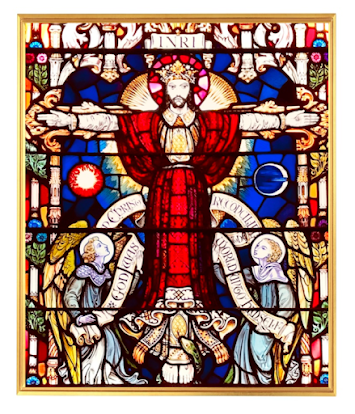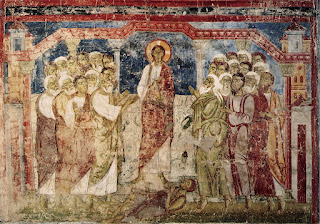The Feast of
Christ the King
November 26,
2023
Well, a lot of Jesus’ parables use these kinds of absolute binaries:
wise vs. foolish bridesmaids, wheat vs. weeds, sons who give lip service vs.
sons who get the job done. Binary options like this accentuate contrasts
between ideas. In the real world, of course, things are rarely black and white.
Interestingly, some sheep breeds common in that part of the world look quite a
bit like goats, and they are often grazed together. Separating them may require
the Shepherd’s practiced eye.
More about sheep and goats later.
This last Sunday before Advent is known as the Feast of Christ the King,
so I want to start with some thoughts on that idea.
Once on a Christ the King Sunday in the Diocese of Chicago—the land of
smells, bells and well-used kneelers—the organist there asked, “Why do we use this
royalist language and perform all these—sort of—Tory gestures?” I mean,
isn't the whole concept of a king outdated, or at least un-American? We fought
a war so we wouldn’t have any more kings. What’s up with all this bowing and
kneeling, anyway? Why do we refer to Christ as a king, of all things?
Kings can be a problem. History vividly shows how things can and do go
horribly wrong when all the power is invested in one individual human. Why
don’t we call Christ something else? A President, maybe?
Well, as we have all seen, being elected is no guarantee of virtue.
People are still people. We voters will sometimes pick notorious sinners and even
outright villains. Maybe this is because they hoodwink us, or maybe we unconsciously
or even consciously see ourselves in them. Even the most well-intentioned
members of Congress are not immune from pride, greed, lust, wrath—I mean, you name
the deadly sin—all seven are easy to find in any earthly government. Like we
read in our lesson from the Hebrew Scriptures, we see a lot of “pushing with
flank and shoulder”…elbow, maybe?…and a lot of head-butting of the weak.
And any human with power, especially absolute power, usually ends up
demanding all kinds of pomps and protocols. You’ve probably heard of strange
rules like—if you’re the monarch, no one can sit while you’re standing, and no
one can turn their back on you to leave a room. People curtsey or salute when
you walk by. When you walk into a room, they play a special song. The human in
charge gets the motorcade, the coach and white horses, the big palace, the
fancy 747.
Jesus made fun of that sort of leader when he rode into Jerusalem, not
riding on a warhorse to intimidate, or in a gilded carriage to be set apart,
but on a small, half-wild donkey. I imagine that, since that animal hadn’t been
ridden before, it might not have been very well-behaved, which would have made
this grand entrance even less dignified. Can you picture it, a grown man making
his “triumphal entry” into a city on a little donkey and getting tossed and
bucked onto the palm fronds?
If that’s what Jesus thought of kings, isn’t it kind of silly to call
him one? Isn’t it maybe even a little insulting? So why is
this the metaphor used in so many Scriptures? And why is Jesus always talking
about God having a Kingdom?
I want to consider what a king is. In an ideal situation, if that were
possible with humans, the relationship between a monarch and a subject would be
a personal one; you promise your undying loyalty, your life and honor, to a
person—not, for instance, to an inanimate object like a flag, or to an
aggregate like a Party. And that person in return promises to look out for you.
It’s a vulnerable kind of relationship, fraught with danger when mortal humans try
it. That’s why democracies like ours don’t use it. It’s political heresy for an
American to swear a loyalty oath to an individual politician (although I guess
there are some that commit that heresy).
But what if the monarch is Jesus? What if we promised our undying
loyalty to him and counted on him to look out for us?
We pray “Your kingdom come” because we long for that kind of
relationship. An ideal king protects his subjects and helps them thrive. He
sets the tone for what kind of place his kingdom is. What kind of place is
Christ’s kingdom, the world where he exists “far above all rule and authority
and power and dominion?” What’s it like in Jesus Land?
Our parable today makes it clear. It’s the place where “I was hungry and
you gave me food, I was thirsty and you gave me something to drink, I was a
stranger and you welcomed me, I was naked and you gave me clothing, I was sick
and you took care of me, I was in prison and you visited me.” Jesus Land is
where need and injustice are addressed with compassion and are finally
defeated.
Frankly, the dystopian world of the goats, where the hungry, the
thirsty, the sick and the incarcerated are neglected, ignored and abused, looks
a lot more familiar. It’s the world we find ourselves living in when we look
around.
In a world where someone besides Jesus is the King, President, Prime Minister,
or Dear Leader, we cut off food aid, pollute the water or just turn it off, put
up barriers to healthcare, bomb hospitals, use the sick as human shields,
persecute the refugees, reject anyone who’s “different,” and when the oppressed
have had enough and defy our laws, we give them moldy bread and throw away the
key.
Where those goats go at the end of the parable, I don’t think that’s
about God being vindictive. Again, remember this is an artificial binary set up
to emphasize a contrast. Many times a contrast like this may be, as Sarah put
it last week, more descriptive than prescriptive. It is an
observation of how things are. I think maybe the goats’ fate is the natural
consequence of making that dystopia our reality. If we create a world of
unwelcome and indifference and cruelty, that is where we’ll live, in a
hellscape separated from God and outside the loving kingdom of Jesus Land.
Whereas, if we choose to make the world around us one of care and
compassion, That’s where we’ll find ourselves existing. I heard about a recent
study that found what might seem obvious, that people who practice acts of
kindness experience quantitatively more joy than those who don’t. What sounds like judgment may be simply bringing out a reality that has been
there all along, a reality we make for ourselves by our choices.
So what is it like to live in Jesus Land? We can find out if we swear
fealty to him as our sovereign and then live like we ARE in Jesus Land.
I have a few ideas of concrete ways we might do this. We can get fresh produce to the diabetic in subsidized housing. We can give winter coats to unhoused people. We can vote for leaders who are committed to getting the lead and PFAS out of everyone's water. We can support clean water projects around the world. Work to make healthcare a right. Venture inside the prison walls to wrap presents for children of incarcerated persons. Help immigrants find housing and jobs, and where we see discrimination, oppression, and hate we can call it out. I would love to hear more suggestions during coffee hour.
I do know that one way not to live in Jesus Land is to set up a
theocracy, where you try to turn a human-run nation-state into the Kingdom of God
by restricting the rights of others. Any time that has been tried, it has turned
out badly. Think witch hunts, inquisitions, “don’t say gay” bills. Curiously,
these wannabe theocrats nowadays seem to be the same people who want to cut
food stamps, dismantle environmental regulations, expel immigrants, and lock
more people up.
So are we sheep or are we goats? The answer is yes. Do the animals in
the parable represent real people? Of course not. No one is all sheep or all
goat. Outside of the world of parable binaries, humans are a hybrid species of
ovine.
None of us follow Jesus’ priorities perfectly, and I’d venture to say
there aren’t many apparent goats who don’t have some sheepish tendencies. It’s
easy to read this parable and see ourselves as good little sheep, but it turns
out that’s what the goats thought. “When did we see you hungry and not feed
you?” And the sheep in the parable don’t know they’re sheep.
Who’s a sheep, and who’s a goat? Can we tell? Does it matter? Really,
only the shepherd knows for sure which is which. It is not our job, as
creatures, to figure out who’s in and who’s out. It is our job to follow our
Shepherd and obey our good King Jesus.


Comments
Post a Comment